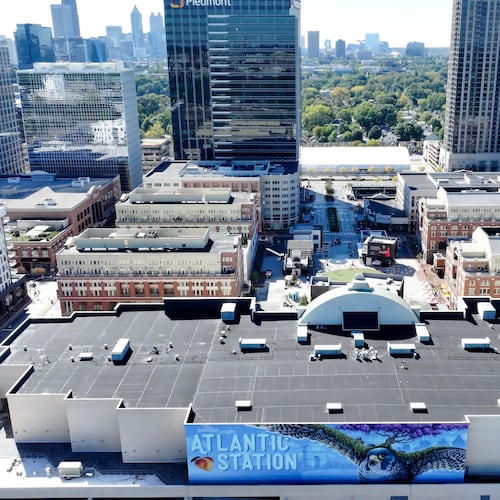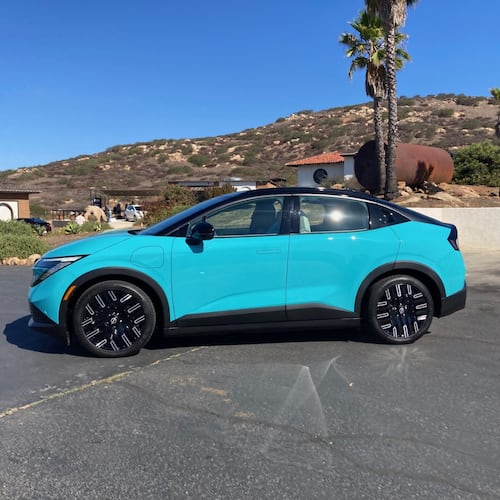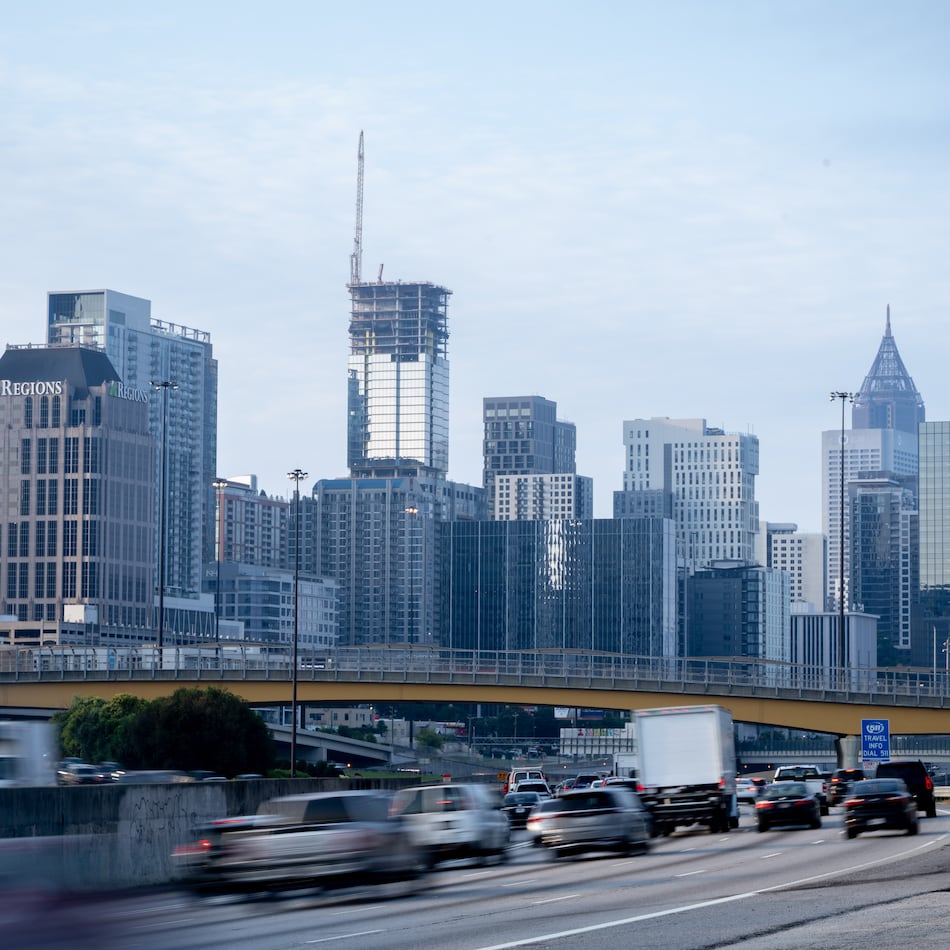Chad Murray has lived for a decade on a tree-lined street in Atlanta’s historic Howell Station neighborhood, roughly three miles northwest of downtown.
Out his front door and across the street is the city’s largest data center campus.
Many Howell Station residents have been locked in fights with the facility’s operator QTS over the constant construction, its requested tax breaks and its electricity needs. Murray was distraught in May to learn most of the neighborhood’s tree buffer with the Fulton County Jail will be clear-cut to build transmission lines to a substation on the QTS campus.
“There’s many people who live here who say that they’re only going to be carried out in a box,” Murray said. “If I do have to go somewhere else, I want to feel like I’m going toward something. I don’t want to get pushed out.”
Credit: Daniel Varnado/For the Atlanta Journal-Constitution
Credit: Daniel Varnado/For the Atlanta Journal-Constitution
Similar battles are playing out across the Atlanta region as data center projects become as common as kudzu. From Rome and Cartersville to LaGrange and Fayetteville, pushback to computer server farms has grown as metro Atlanta emerges as the country’s most desired data center market.
Neighbors have banded together over concerns that data centers will drain their natural resources, generate noise and pollution, strain their utility grids and hurt their quality of life. Local officials have faced protests, petitions and packed meetings when considering new data centers.
The pushback has surprised the industry and some elected leaders. Data center proponents have started a charm offensive and argue these facilities are tax revenue machines, create high-paying jobs and are less intrusive than factories or other large industrial projects.
“There’s so much misinformation we have to get in front of, especially in Georgia because we are a prime area for these types of facilities,” said Union City Mayor Vince Williams, who has championed a Microsoft data center in his city. “We’ve got to make sure that we’re informing our community members that these are not harmful.”
Industry insiders have labeled the phenomena as the new NIMBY flashpoint, meaning “not in my backyard.” A few data center proposals have been withdrawn or voted down by local governments, but several projects have been approved despite community objections.
Emotions overflowed during an April meeting in Coweta County, where a sea of residents wearing yellow shirts filled seats. They pleaded with commissioners to oppose a $1 billion data center campus called Project Peach. Officials from neighboring Palmetto in south Fulton County also spoke.
“This would fundamentally alter the character of our community,” Palmetto Mayor Teresa Thomas-Smith said. “We have no desire to see a massive industrial facility less than one mile from our historic downtown.”
Credit: Courtesy of Coweta County
Credit: Courtesy of Coweta County
The Coweta commission voted 3-2 to move the project forward.
Billions blocked
The pushback to data centers is not just an Atlanta area phenomenon.
At least $64 billion worth of data center projects have been blocked or delayed nationwide, according to a May report by Data Center Watch, a research effort backed by artificial intelligence security company 10a Labs. The initiative has counted at least 140 grassroots anti-data center groups.
Most of those stymied projects are in Virginia, which has long been the largest American data center market. Atlanta is No. 2.
Since the report published, a few Georgia proposals have been blocked or delayed.
The LaGrange City Council in March denied an annexation and rezoning request for a $9.7 billion data center proposal. A $4.5 billion proposal in Bartow County was withdrawn in May after the county’s planning commission recommended denying its rezoning request.
Credit: Courtesy Amazon Web Services / Noah Berger
Credit: Courtesy Amazon Web Services / Noah Berger
Josh Cauthen was among the residents leading the Bartow opposition. He said the project was proposed for land currently zoned for agricultural use and is miles from industrial land.
“If this goes through, you’ve placed an industrial zoning in the area, and it’ll open up the floodgates for all the properties around it,” Cauthen said.
The Bartow project is among five data center campuses proposed by Atlas Development, a Georgia firm that specializes in clearing local zoning and permit hurdles before selling entitled sites to established developers. Atlas declined to comment.
The feverish data center demand has created a market for any piece of large land near power infrastructure to be a target, especially for speculative sellers, Cauthen said.
“There’s no money for land flippers if the site is already zoned industrial,” he said.
‘Run roughshod over people’
The growing digital world and arms race over AI has made data centers a national issue.
Both the Biden and Trump administrations focused on expanding AI capabilities and American energy grids — although divides over clean energy and fossil fuels remain partisan.
Trump’s Department of Energy has even outlined 16 federal sites, though none so far in Georgia, for potential data center construction. Trump’s endorsed “Big Beautiful Bill” that passed through the House includes a 10-year block on states regulating AI, though it could crimp federal incentives.
Credit: Courtesy Microsoft
Credit: Courtesy Microsoft
Josh Levi, president of national trade association Data Center Coalition, said these facilities are critical infrastructure and that site selection is important. His organization’s members want to be good neighbors.
“This is an industry that’s driving a lot of change and responding to a lot of change that residents, businesses and governments are driving as they’re seeking to use more data,” he said.
Than Hunter, a Howell Station resident, said data center expansion and cumbersome transmission lines are a price to pay for living in a tech-dominated world.
“We as people have created this,” he said. But that demand for data should not mean that governments and companies are allowed “to run roughshod over people.”
Credit: Daniel Varnado/For the Atlanta Journal-Constitution
Credit: Daniel Varnado/For the Atlanta Journal-Constitution
QTS, a subsidiary of private equity giant Blackstone, declined to answer questions on local controversies, but a company spokesperson said its data centers benefit Atlanta’s tech ecosystem and generate tax revenues that benefit its neighbors.
“This revenue goes to advancing community initiatives while significantly reducing the tax burden on residents,” QTS said in a written statement. “The tax revenue often supports local priorities and addresses issues like school overcrowding, affordable housing, local park projects and the funding of police and fire departments.”
City of Atlanta leaders have limited where new data centers can be built, barring them along the Beltline, near MARTA stations and in select neighborhoods. The QTS campus near Howell Station wouldn’t be able to be built today under those regulations.
Jonathan Baker, founder of Monday Night Brewing who also lives in Howell Station, said he’s glad those actions have been taken, but it gives little solace to him and his neighbors.
“Sad it took this to get to that point,” he said of the data center restrictions. “It seems like a no-brainer, but here we are.”
Credit: Daniel Varnado/For the Atlanta Journal-Constitution
Credit: Daniel Varnado/For the Atlanta Journal-Constitution
Raul Martynek, CEO of operator DataBank, said data centers are like any other business that has to follow local zoning laws and regulations.
“If you don’t want to have data centers, reject all that stuff (the incentives) and don’t build any more power,” he said. “Guess what, the data center sector will adapt, and we’ll go somewhere else.”
Editor’s note: This article has been updated to correct the spelling of the name of Palmetto Mayor Teresa Thomas-Smith.
About the Author
Keep Reading
The Latest
Featured






